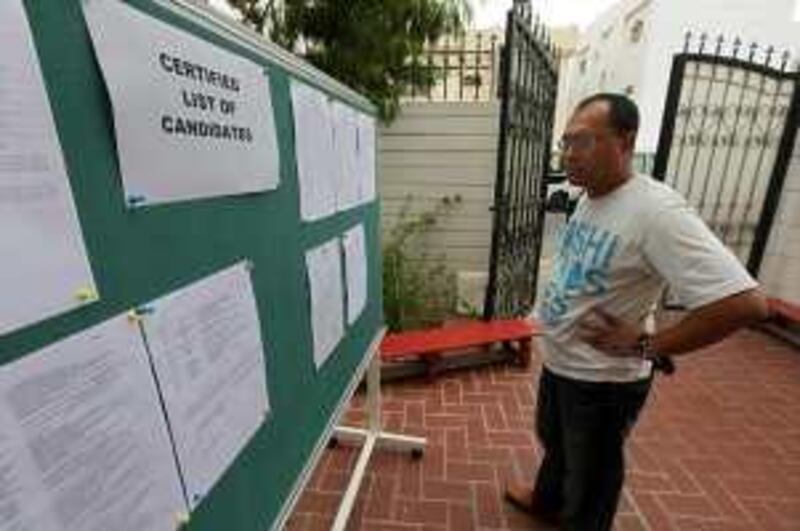ABU DHABI // The Philippines' overseas absentee voting law acts as a disincentive for millions of Filipinos living abroad and needs to be amended, according to Ramon Casiple, a political analyst in Manila. Out of eight million Filipinos working overseas, only 589,830 registered to vote last year, according to the Philippines' Commission on Elections (Comelec). Just 10 per cent of the 450,000 living in the UAE registered.
"The potential of overseas Filipino workers in participating in Philippine elections is vast," Mr Casiple said. "They can provide funds, other perspectives, and votes, if you include their families." Mr Casiple, who is the executive director of the Institute for Political and Electoral Reforms in Manila, said the current law on overseas absentee voters does not work because it requires voters to promise to return permanently to the Philippines within three years.
Under the law, an immigrant or permanent resident who wants to vote must present an affidavit declaring that he would resume "actual physical permanent residence" in the Philippines not later than three years from the approval of his voter registration. The law also requires voters to make a personal appearance at an embassy or consulate to register and vote, he said, which can be impractical in certain countries, such as Saudi Arabia, because of distance.
"It also requires current addresses in host countries; this effectively puts the undocumented worker in danger," Mr Casiple said. Today, Filipinos get their last chance to vote for their country's next president. Although 47,000 Filipinos in the Emirates are eligible to vote because they registered to do so last year, the turnout has been far lower. By Friday, 3,021 Filipinos had cast their ballots at the Embassy in Abu Dhabi and 2,846 at the consulate in Dubai, according to Manila's foreign affairs department.
"I don't know if my colleagues and friends found time to vote," observed Mario Ramos, 31, a manager at an export-import company in Sharjah. "They're not interested. We're all busy at work." Bobby Santo Domingo, 38, a web developer in Abu Dhabi who voted yesterday, said: "If most Filipinos here are too busy to vote, then I don't think we'll see any genuine change in our country. I voted because I know that a single vote counts and that it will make a difference."
The consulate will be open for voting today from 7.30am to 2pm, as will the Embassy from 8:30am to 2pm, to coincide with the 6pm end of voting in the Philippines. @Email:rruiz@thenational.ae





